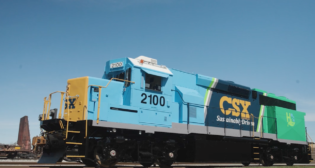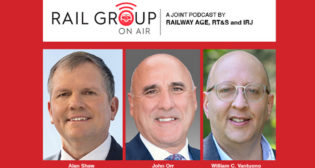
Mexican Rail Regulators Turn Up The Heat
Written by William C. Vantuono, Editor-in-Chief
The Rail Transportation Regulatory Agency of Mexico (ARTF), described as “a decentralized body of the Secretariat of Communications and Transportation,” established, nearly 25 years after the country’s national railroad was privatized, rate regulations for its three railroad concessions—Ferrocarril Mexicano, SA de CV (Ferromex), Ferrosur, SA de CV, and Kansas City Southern de México, SA de CV (KSCM).
The action took place after the Board of Commissioners of the Mexican Federal Economic Competition Commission (COFECE) determined, in January of this year, “the absence of effective competition conditions in 20 origin-destination pairs for the transportation of chlorine, ethylene oxide, anhydrous ammonia, and caustic soda in the south of the state of Veracruz.”
For KCSM, ARTF’s resolution set out rate regulation limited to 6 segments of 5 routes where the railroad provides freight transportation of chlorine (4 segments of 3 routes) and ethylene oxide (2 segments of 2 routes). KCSM, in a statement to Railway Age, noted that during 2019, its revenue associated with these segments was less than $1.5 million.
As KCS noted on Feb. 10, 2020, “ARTF’s rate regulation power is related to and triggered by the final report of the Mexican Federal Competition Commission (COFECE) of Feb. 6, 2020 regarding effective competition in freight transportation services of chemicals and petrochemicals in routes from South Veracruz pertaining to KCSM. COFECE found that 5 routes that include segments operated by KCSM where chlorine and ethylene oxide are shipped lacked effective competition. The scope of this rate regulation is limited to the routes and segments where COFECE found a lack of effective competition. KCSM challenged the Final COFECE Report in late February 2020 on constitutional and legal grounds. A final decision on the matter is pending. KCSM is evaluating the Agency’s resolution, its implications and remedies available.”
“These resolutions (the agency’s first) are the result of more than two years of research work within ARTF, first developing the corresponding guidelines that were published in the Official Gazette (DOF) in February, and subsequently the methodology to regulate rates in the absence of competition in markets of rail services,” ARTF noted. “The research included a review of analogous cases in countries with similar rail networks to Mexico, such as Canada, the United States and Brazil, considering advantages and disadvantages as well as applicability for the Mexican Rail System (SFM).
“The model used in these resolutions consists of establishing a maximum rate per tonne-kilometer for each combination of route, a portion of route, and the product. The maximum rate is calculated from the average total costs multiplied by a differentiating factor per product plus a reasonable profit that allows the concessionaire to invest in a sector that is particularly capital intensive. This model takes up some characteristics of the costing and accounting methodologies applied in the U.S. and Canada, with the advantage of being simpler. It also considers good regulatory practices from other sectors applicable to the case and gives legal certainty and fosters the reasonable balance that must prevail between the users and concessionaires of the SFM.
“With these measures, ARTF consolidates its actions as the regulatory authority of the rail sector in Mexico, in the exercise of its attributions framed in the articles 6 Bis, section IV and 47 of the Law on Regulation of Rail Services (LRSF); as well as 173 of the Bylaw on Rail Services and fulfilling one of its objectives outlined in article SECOND of its creation Decree, referring to the regulation of the operation, exploitation and the provision of the public rail transport service.”



